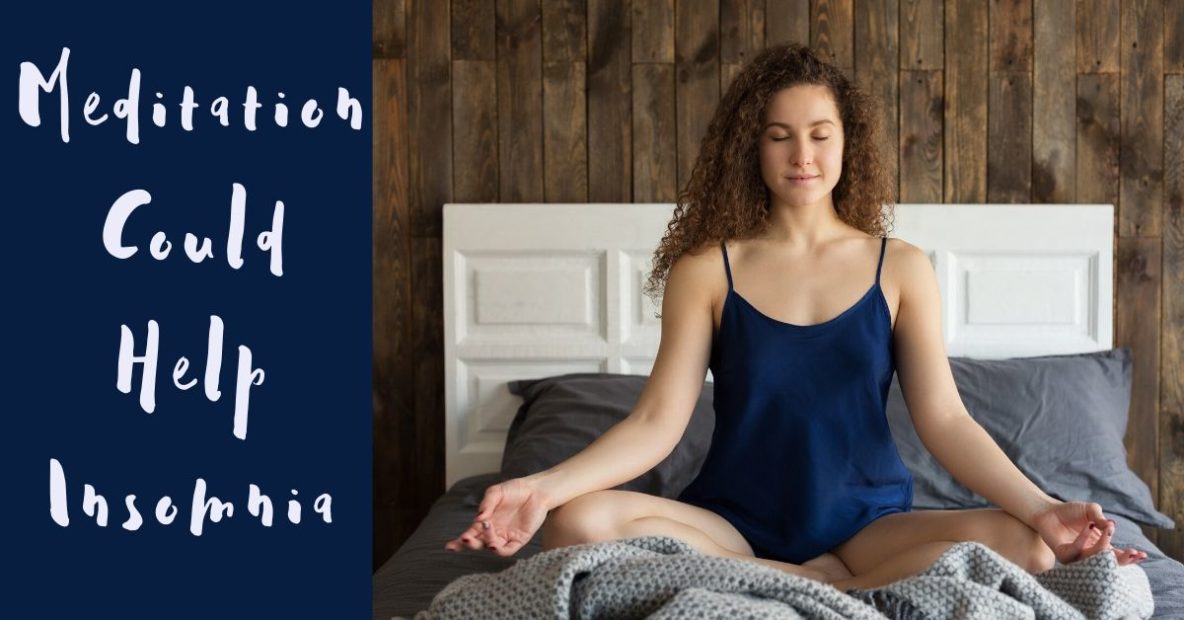Meditation Could Help Insomnia

- A Promising Paradigm Shift: New Research Challenges the CPAP-First Approach to OSA Treatment - September 5, 2023
- Understanding Sleep Meditation Techniques - July 30, 2021
- How Online Learning Has Affected Sleep for Students - July 13, 2021
Have you been getting enough sleep? Adults need 7 to 9 hours of sleep each and every night to wake up feeling refreshed and ready to start a new day. If you’re not sleeping enough, think about what’s keeping you up at night. According to the American Psychological Association, 43% of adults report that stress has made it hard to fall asleep at night, and contributes to insomnia. Have you been feeling too stressed to sleep, or spend a long time awake rather than drifting off to sleep soon after going to bed? Meditation could help your insomnia, and make you more relaxed before bed.
What Is Insomnia?
Insomnia is a general term used to describe trouble falling asleep at night, wakefulness during the night, and an overall lack of sleep. You experience insomnia when your brain stays awake even if your body is exhausted, and doesn’t allow the body to enjoy the natural sleep and wake cycles. Insomnia can be caused by:
- Allergies
- Acid reflux
- Asthma
- Chronic pain
- Parkinson’s disease
- Hormonal changes
- Restless leg syndrome
- Sleep apnea
- Irregular sleep schedule
- Certain medications
Insomnia is also closely linked to your mental health and wellbeing. When you’re not getting enough sleep, stress and anxiety levels are very high. This will make it harder for you to fall asleep at night, and will make you feel even more stressed! Factors that play a major role in insomnia include:
- Depression
- Anxiety
- Mental illness
- Worry about the past and the future
- Feeling overwhelmed by tasks
How Meditation Can Help
If you’re dealing with chronic insomnia, meditation can help. Meditation is a way to break the cycle of stress and anxiety, and help you get to sleep. Meditation will allow you to destress, and release the thoughts that are keeping you awake. Using either mindfulness, breathing exercises, or deep relaxation techniques, you can reduce anxiety, fall asleep easier, and sleep for longer.
Meditation is completely safe to try, and this natural solution to better sleep doesn’t come with any negative side effects. Meditation can help you sleep better without sleeping pills, and help you calm your mind in preparation for sleep. Meditation can also lower your blood pressure, reduce your experience of pain, and lighten your mood.
Meditation and Mindfulness Techniques
There are a number of meditation and mindfulness techniques you can try, and all have the same benefits. The important thing is that you’re focusing on meditation, gently letting go of other thoughts, and being present in the moment. Start by finding a comfortable position. You can meditate sitting on the floor, with your back against a wall for support, in a chair that allows you to sit upright, or even laying on the floor or in bed. Gently close your eyes and breathe, letting go of all the thoughts that are crowding into your mind.
- Breathing Technique: You can practice a breathing technique by focusing your attention on your breath. Notice the inbreath and the outbreath, and feel the rise and fall of your diaphragm with each breath. When your wind wanders to other thoughts, bring your attention back to the moment, and focus on your breath.
- Awareness of Sensation Technique: You can try another form of mindfulness, bringing your awareness to your body. Feel the sensations on your skin, like the feeling of the floor against your sit bones, or the tingling feeling on your nose. Focus on the sensations you feel, and notice where they arise on your body.
When you first start practicing mindfulness or meditation, set aside 5 or 10 minutes before bed to be in the present moment, and leave your thoughts behind. Don’t worry if your mind wanders every few seconds, that’s completely normal. The important thing is that you keep bringing your focus back to your breath and back to your body. You’ll soon notice the effects on your sleep, and feel less anxious as you fall asleep. Meditation will help you release stressful thoughts, and calm your mind.
Our team is dedicated to helping you sleep better. We will help you examine your sleep habits and sleep hygiene. We’ll also look for signs of a sleep disorder, or other cause to your insomnia, and help you get to sleep easily every night.
